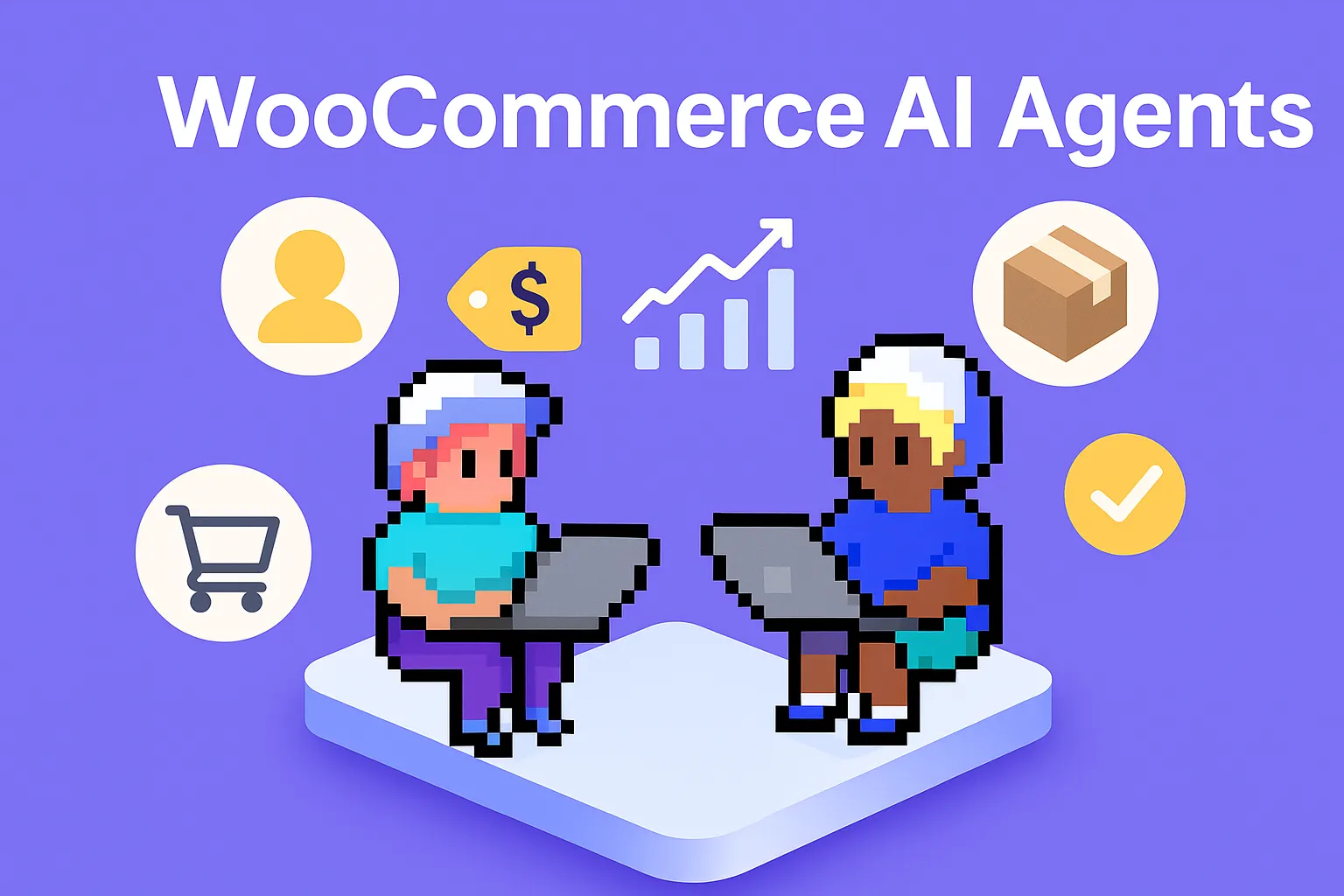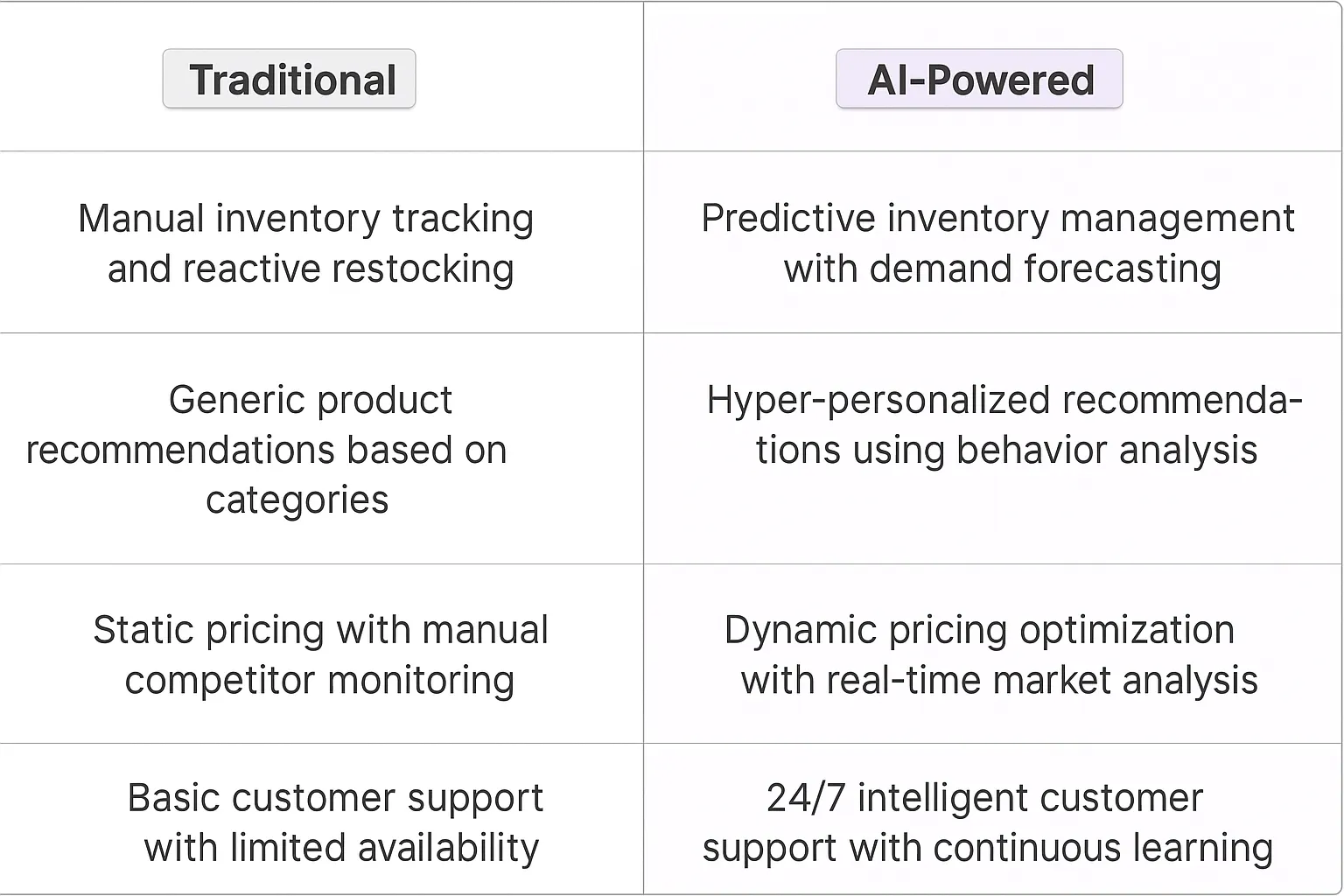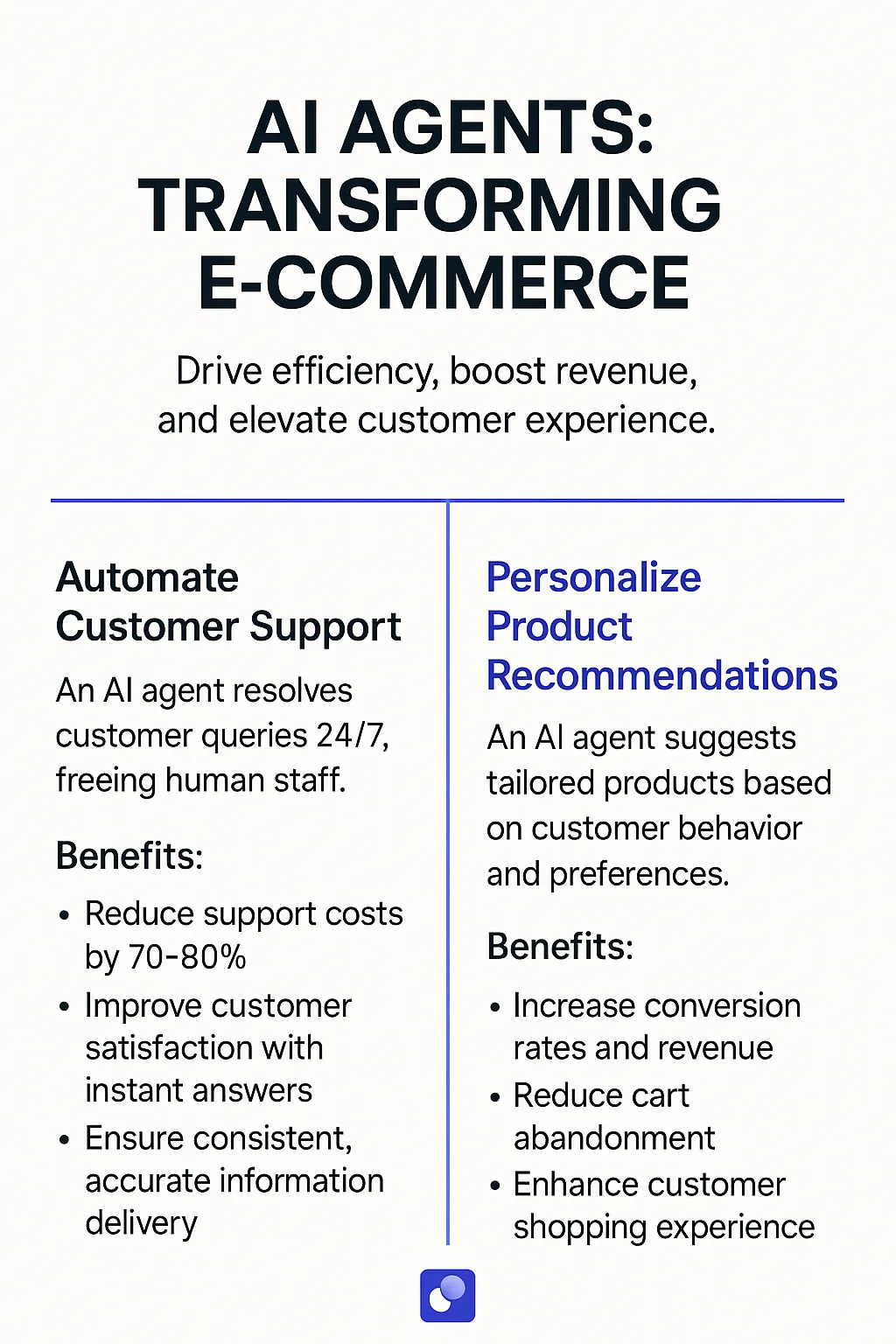WooCommerce AI Agents
Understanding WooCommerce
WooCommerce is an open-source e-commerce plugin for WordPress, powering millions of online stores worldwide. It's a flexible, customizable platform that allows businesses of all sizes to sell products and services online. WooCommerce provides a robust set of features for inventory management, payment processing, shipping integration, and more, making it a go-to solution for entrepreneurs and established businesses alike.
WooCommerce stands out with its extensive feature set:1. Seamless WordPress integration2. Customizable product pages and checkout processes3. Flexible shipping options and tax calculations4. Support for physical and digital products5. Extensive plugin ecosystem for added functionality6. Built-in analytics and reporting tools7. Mobile-responsive design out of the box8. SEO-friendly structure9. Multi-currency and multi-language support10. Scalability to grow with your business

Benefits of AI Agents for WooCommerce
What would have been used before AI Agents?
Before AI agents entered the scene, WooCommerce store owners were stuck in a loop of manual tasks and inefficient processes. They'd spend hours sifting through customer inquiries, updating product listings, and troubleshooting order issues. It was like trying to run a marathon with your shoelaces tied together – possible, but painfully slow and inefficient.
The typical WooCommerce setup relied heavily on plugins and extensions, each solving a specific problem but often creating a patchwork of solutions that didn't quite fit together seamlessly. Store owners would juggle between different tools for inventory management, customer support, and sales analytics. It was a constant game of whack-a-mole, addressing issues as they popped up rather than proactively optimizing the entire ecosystem.
What are the benefits of AI Agents?
Enter AI agents for WooCommerce – it's like giving your online store a brain transplant. These digital teammates are game-changers, transforming how e-commerce businesses operate at their core. Let's break down the key benefits:
1. Hyper-personalized customer experiences: AI agents analyze customer behavior patterns and preferences in real-time, tailoring product recommendations and search results with uncanny accuracy. It's like having a personal shopper for every customer, but one that never sleeps or takes coffee breaks.
2. Predictive inventory management: Say goodbye to the "out of stock" nightmare. AI agents forecast demand based on historical data, seasonal trends, and even social media buzz. They're essentially crystal balls for your inventory, ensuring you're always stocked up on what's about to fly off the digital shelves.
3. Dynamic pricing optimization: AI agents continuously monitor competitor pricing, demand fluctuations, and market trends to adjust your prices in real-time. It's like having a team of expert economists working 24/7 to maximize your profit margins.
4. Intelligent customer support: These digital teammates can handle a barrage of customer queries simultaneously, providing instant, accurate responses. They learn from each interaction, becoming smarter over time. It's customer service on steroids, minus the mood swings.
5. Fraud detection and prevention: AI agents act as vigilant guardians, analyzing transaction patterns to flag potential fraud faster than you can say "chargeback." They're your store's immune system, constantly evolving to combat new threats.
6. SEO and content optimization: These digital wordsmiths can generate product descriptions, blog posts, and meta tags that are not just SEO-friendly but actually resonate with your target audience. It's like having a content team that intimately knows both search algorithms and human psychology.
7. Conversion rate optimization: AI agents continuously run micro-experiments on your store, tweaking layouts, CTAs, and user flows to squeeze out every possible conversion. They're growth hackers that never sleep, always pushing to improve your bottom line.
The integration of AI agents into WooCommerce isn't just an upgrade; it's a paradigm shift. It's taking your e-commerce store from a bicycle to a Tesla – sure, they both get you from A to B, but the experience and efficiency are in completely different leagues. As these AI agents continue to evolve, they'll not only manage your store but potentially drive strategic decisions, opening up new markets and opportunities you might never have considered. Welcome to the future of e-commerce – it's smarter, faster, and exponentially more powerful.

Potential Use Cases of AI Agents with WooCommerce
Processes
WooCommerce AI agents are poised to transform e-commerce operations. These digital teammates can handle complex, multi-step processes that typically consume significant human resources. For instance, they can manage the entire product lifecycle - from initial listing to inventory updates and eventual discontinuation. This isn't just about automation; it's about bringing a level of consistency and precision that's hard to achieve manually.
Another process ripe for AI enhancement is order fulfillment. WooCommerce AI agents can orchestrate the entire journey from order placement to shipping, interfacing with inventory systems, payment gateways, and logistics providers. They can make real-time decisions on optimal shipping routes, package consolidation, and even predict potential delivery issues before they occur.
Tasks
On a more granular level, WooCommerce AI agents excel at handling specific, repetitive tasks that are crucial for smooth e-commerce operations. Think about product description generation - an AI agent can craft compelling, SEO-optimized descriptions for hundreds or thousands of products in a fraction of the time it would take a human team. And it's not just about speed; these descriptions can be tailored to match your brand voice and target specific customer segments.
Customer support is another area where AI agents shine. They can handle routine inquiries about order status, return policies, or product specifications, freeing up human agents to deal with more complex issues. But it goes beyond simple chatbot functionality - these AI agents can learn from each interaction, continually improving their responses and even predicting customer needs based on past behavior.
Pricing optimization is a task that's tailor-made for AI. WooCommerce AI agents can analyze vast amounts of data - competitor pricing, demand fluctuations, inventory levels, and even social media sentiment - to suggest optimal pricing strategies. This isn't just set-it-and-forget-it pricing; it's dynamic, responsive, and designed to maximize your margins while staying competitive.
The beauty of these AI agents is their ability to learn and adapt. They're not static tools, but evolving digital teammates that get better with each task they perform. As they integrate more deeply with your WooCommerce setup, they'll uncover inefficiencies and opportunities that humans might miss, driving continuous improvement in your e-commerce operations.
The potential of AI agents in WooCommerce isn't about replacing humans - it's about augmenting human capabilities. By handling the routine, time-consuming tasks, these agents free up your team to focus on strategy, creativity, and building meaningful customer relationships. It's a shift that could redefine what it means to run an e-commerce business, pushing the boundaries of efficiency and customer service to new heights.

Industry Use Cases
The versatility of AI agents in WooCommerce makes them valuable across various industries. Let's dive into some meaty, industry-specific use cases that showcase how AI can level up workflows and processes in e-commerce.
AI isn't just a fancy add-on for WooCommerce stores; it's becoming the secret sauce that separates the winners from the also-rans. These digital teammates are like having a team of tireless, data-crunching ninjas working 24/7 to optimize every aspect of your online store.
From predicting inventory needs with uncanny accuracy to personalizing product recommendations that make customers feel like you're reading their minds, AI agents are transforming WooCommerce from a simple shopping cart into a sophisticated sales machine.
But here's the kicker: the real power of AI in WooCommerce lies in its ability to uncover insights and opportunities that humans might miss. It's like having a business partner with superhuman pattern recognition skills, constantly scanning for ways to boost conversions, reduce cart abandonment, and keep customers coming back for more.
So, let's roll up our sleeves and explore how different industries are leveraging AI agents in WooCommerce to create e-commerce experiences that are not just functional, but downright addictive.
E-commerce Fashion: AI-Powered Personal Stylists
The fashion industry is ripe for disruption with WooCommerce AI Agents. Let's dive into how these digital teammates can transform the online shopping experience for fashion retailers.
Think of an AI Agent as your store's 24/7 personal stylist. It's not just about recommending products; it's about creating a personalized shopping journey that rivals the best boutique experiences.
These AI-powered stylists can analyze a customer's past purchases, browsing history, and even social media activity to understand their unique style preferences. They don't just push products; they curate looks, suggest outfit combinations, and provide styling advice tailored to each shopper's body type, skin tone, and lifestyle.
But here's where it gets interesting: these agents can also tap into real-time trend data. They're not just reacting to what's hot now; they're anticipating what will be trending next season. This predictive capability allows fashion retailers to stay ahead of the curve, adjusting inventory and marketing strategies based on AI-driven insights.
The potential for upselling and cross-selling is massive. An AI stylist might suggest a belt to complete an outfit or recommend shoes that perfectly match a newly purchased dress. It's like having a fashion-savvy friend who always knows exactly what you need to look your best.
Moreover, these AI Agents can handle complex queries about fabric care, size recommendations, and even ethical sourcing - topics that often require specialized knowledge. This depth of interaction builds trust and keeps customers coming back, driving both loyalty and lifetime value.
The beauty of this application is its scalability. Whether you're a small boutique or a major fashion retailer, WooCommerce AI Agents can provide a level of personalized service that was previously impossible at scale. It's not about replacing human creativity in fashion; it's about augmenting it with data-driven insights and round-the-clock availability.
As we move towards a more personalized, on-demand shopping culture, AI-powered personal stylists could become the secret weapon for fashion e-commerce businesses looking to stand out in a crowded market. It's not just a tool; it's a competitive advantage that could redefine the online fashion retail landscape.
Home Improvement: AI-Driven Project Planning and Management
The home improvement sector is ripe for AI-driven transformation, and WooCommerce AI Agents are poised to lead this change. These digital teammates aren't just product recommenders; they're becoming full-fledged project managers and design consultants.
Think about the typical home improvement journey. It's often fragmented, time-consuming, and fraught with uncertainty. AI Agents can consolidate this process, offering a seamless experience from inspiration to completion.
These agents can analyze a customer's space using uploaded photos or 3D scans, then suggest personalized renovation ideas. They're not just pulling from a static database; they're learning from millions of projects, understanding what works aesthetically and functionally for similar spaces.
But here's where it gets interesting: these AI Agents can create detailed project plans, breaking down complex renovations into manageable steps. They can estimate costs, suggest materials, and even recommend local contractors from the store's network. It's like having a seasoned project manager in your pocket, available 24/7.
The upsell potential here is massive. As the AI understands the scope of a project, it can suggest additional products or services that the customer might not have considered. Need special tools for that tile installation? The AI's got you covered. Considering eco-friendly options? It can provide a cost-benefit analysis of sustainable materials.
Moreover, these agents can handle complex queries about building codes, material compatibility, and installation techniques. This depth of knowledge builds trust and positions the e-commerce store as an authoritative resource in home improvement.
The scalability of this application is its true power. Whether you're a small hardware store or a national home improvement chain, these AI Agents can provide personalized, expert-level advice to every customer. It's not about replacing human expertise; it's about augmenting it with data-driven insights and round-the-clock availability.
As we move towards more DIY and personalized living spaces, AI-powered project planning could become the differentiator for home improvement e-commerce. It's not just a tool; it's a complete reimagining of how we approach home renovations in the digital age.
Considerations and Challenges for WooCommerce AI Agents
Implementing AI agents for WooCommerce isn't just about plugging in some cool tech and watching the magic happen. It's a complex dance of technology, business strategy, and user experience. Let's dive into the nitty-gritty of what you're really signing up for when you decide to bring AI into your WooCommerce setup.
Technical Challenges
First off, let's talk tech. WooCommerce is built on WordPress, which means you're dealing with a PHP-based system. Integrating AI, which often runs on Python or other languages, can be like trying to fit a square peg in a round hole. You'll need to think about API integrations, data flow, and potentially even custom middleware to make everything play nice together.
Then there's the issue of data. AI is hungry for it, but your WooCommerce store might not be serving up the feast you think it is. You'll need to consider data quality, quantity, and variety. Are you capturing enough user interactions? Is your product data structured in a way that AI can make sense of it? These are questions you'll need to grapple with.
Operational Challenges
On the operational side, things get even trickier. You're not just implementing a new feature; you're potentially reshaping how your entire e-commerce operation functions. This means retraining staff, updating processes, and possibly even restructuring teams.
Customer service is a prime example. If you're using AI for chatbots or customer queries, you'll need to figure out the handoff between AI and human agents. When does the AI tap out and a human step in? How do you ensure the transition is smooth and doesn't leave customers feeling like they're being passed around?
Ethical and Legal Considerations
Let's not forget the ethical minefield you're stepping into. AI decision-making can be a black box, and when you're dealing with customer data and purchasing decisions, transparency is key. You'll need to think about bias in your AI models, data privacy (hello, GDPR and CCPA), and how to explain AI-driven decisions to customers who might be skeptical or confused.
Cost-Benefit Analysis
Finally, there's the million-dollar question: Is it worth it? AI isn't cheap, and the ROI isn't always clear-cut. You'll need to weigh the costs of implementation, ongoing maintenance, and potential disruptions against the promised benefits. Are you looking at increased conversions? Better customer retention? Operational efficiencies? Make sure you have clear, measurable goals before you take the plunge.
Implementing AI in WooCommerce is not for the faint of heart. It's a complex undertaking that touches every part of your e-commerce ecosystem. But for those who navigate these challenges successfully, the potential rewards in terms of customer experience, operational efficiency, and competitive advantage can be substantial. Just make sure you go in with your eyes wide open and a solid game plan.
Embracing the AI Revolution in E-Commerce
The integration of AI agents into WooCommerce marks a pivotal shift in e-commerce. These digital teammates are not just enhancing existing processes; they're redefining what's possible in online retail. From hyper-personalized shopping experiences to predictive inventory management and dynamic pricing, AI is pushing the boundaries of efficiency and customer service.
However, this transformation comes with its own set of challenges. Technical integration, data management, operational restructuring, and ethical considerations all need careful navigation. The key to success lies in approaching AI implementation strategically, with clear goals and a solid understanding of both the potential and the pitfalls.
As we look to the future, it's clear that AI in WooCommerce isn't just a trend – it's becoming a necessity for staying competitive in the rapidly evolving e-commerce landscape. Those who can effectively harness these technologies will find themselves at the forefront of a new era in online retail, where data-driven insights and automated processes create unparalleled value for both businesses and consumers.
The journey of integrating AI into WooCommerce is complex, but the potential rewards are immense. As these technologies continue to evolve, we can expect even more innovative applications that will further blur the lines between physical and digital commerce, creating experiences that are more intuitive, efficient, and personalized than ever before.













